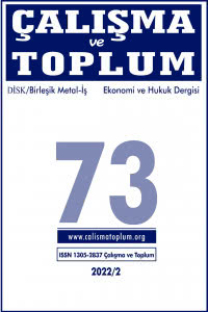Sermeye Hareketleri ve Türkiye’nin Beş Krizi
1989 yılında sermaye hareketlerinin serbestleştirilmesinin ardından Türkiye sermaye girişlerindeki ani durma ve canlanmalar sonucunda 1994, 1998-99, 2001, 2008-2009 yıllarında ve Mart ya da alternatif olarak Ağustos 2018 başlamış olan ve halen sürmekte olan beş kriz yaşadı. Önceki dört krizi ve etkilerini başka çalışmalarımda inceledim. Bu çalışmanın amacı mevcut krizin erken aşamasını geçmiş krizlerle karşılaştırmaktır. Mevcut kriz henüz sürmekte olduğundan, elbette sonuçlarını önceki krizlerle karşılaştırmak için zaman yeterince olgunlaşmamıştır. Yine de burada sunulan ilk bulgular, bu alanda yapılacak gelecek çalışmalar için bir başlangıç oluşturabilir. Yazıda sermaye akımlarındaki duraklama ve canlanmaların zamanları ile bunların GSYİH üzerine etkilerine eşanlı ya da gecikmeli ilişkin bir çerçeve sunulmuştur. 2018 Mart ayından Temmuz’a yabancı ve toplam sermaye hareketleri belirgin ölçüde düşmüştür. Ancak bu daralmanın negatif etkisi Nisan ve Temmuz ayındaki “düzelmeler” ile bir ölçüde yumuşamıştır. Ağustos 2018 ve sonrasında, sermaye hareketleri yeniden tersi bir eğilime girmiş ve izleyen iki ayda ekonomi üzerine olumsuz etkileri ortaya çıkmaya başlamıştır. Bu daralmanın etkileri önceki krizlerden daha güçlüdür. Bu süreç ve eğilimi Türkiye’nin önceki krizleri ile karşılaştırmayı amaçlayan yazı, mevcut iktidarın kriz üzerine değerlendirmeleri ile son bulmaktadır
Anahtar Kelimeler:
Finansal krizler, Sermaye hareketleri, Sermaye hesaplarının serbestleşmesi, Türkiye ekonomisi
Capital Movements and Five Crises in Turkey
After the liberalization of the capital account in 1989, Turkey experienced five crises due to sudden stops and reversals of capital inflows, namely in 1994, 1998-99, 2001, 2008-2009 and a fifth one which appears to have started in March or alternatively August 2018 and is still ongoing. The preceding four crises had been analysed by the author in an earlier paper. The present paper aims to compare the early phase of the current crisis with the preceding ones. Since the current crisis is still ongoing, its comparison with the earlier ones is premature. Nevertheless present findings may serve as a starting point for further research on the same theme. A framework for comparing the “calendar of capital flow stops / reversals” is outlined and linked to their simultaneous or delayed incidence on GDP. From March to July 2018, foreign and total capital movements decline significantly, but their negative impact is mitigated by “corrections” in such flows in April and July. From August 2018 onwards, capital flows move into a reversal pattern and adverse impact on the real economy starts to takes place during the two following months. A comparison of individual capital flow items and the current account shows that the ongoing crisis demonstrates no unique feature: The overall pattern shaped by foreign and net capital flow totals are roughly identical. Resident, non-resident flows and “errors and omissions” exhibit parallel or diverging patterns with some of the earlier ones. The relative magnitude of the external shock measured by the “reversal” of foreign or net capital flows as a ratio of GDP in dollar terms of the precrisis period is compared for the five crises. The relative magnitude of the March-October 2018 shock is roughly comparable with the preceding crises. The August-October shock is stronger than the first three crises and is comparable with the 2008-2009 crisis. The paper also includes a brief analysis of the contribution capital flow slowdown on the third quarter of 2016 to the GDP decline during the same period. The paper ends with an assessment of the government response to the current crisis.
___
- Boratav, Korkut (2011) “Serbest Sermaye Hareketleri ve Kriz-Küçülme Dönemeçleri: 1990-2010”, Bilsay Kuruç’a Armağan Ankara, Mülkiyeliler Birliği Yayını.
- IMF (2018), Turkey: Staff Report for Article IV Consultation, Nisan 2018.
- IMF(2012), The Liberalization and Management of Capital Flows: An Institutional View.
- UNCTAD (1999), Trade and Development Report 1998, United Nations, New York and Geneva
- Krugman, Paul (2018) “Partying Like It’s 1998”, New York Times, 11.Ağustos 2018.
- Türel, Oktar (2017) Küresel Tarihçe 1945-79, İstanbul, Yordam Kitap.
- ISSN: 1305-2837
- Yayın Aralığı: Yılda 4 Sayı
- Başlangıç: 2003
- Yayıncı: DİSK Birleşik Metal-İş
Sayıdaki Diğer Makaleler
Sanayide Otomasyon ve Kadın Emeği
Sorgulayıcı Veri Çözümlemesine Bir Örnek: İllere Göre İşsizlik Oranları, 2008-2013
Crises, Restructuring and The Legitimacy of Capitalism
Jayati GHOSH, C. P. CHANDRASEKHAR
Finansallaşma, Yeni Sınıfsal Çelişkiler ve Devletin Dönüşümü
zun Durgunluk ya da Yapısal Kriz: Kriz İktidarının Krizine Dair Gözlemler
Serdar BAHÇE, Ahmet Haşim KÖSE
Zonguldak Havzasında İşçi Hareketleri ve 1990-1991 Büyük Madenci Grevi
Yeni Anayasa ve Yeni Devlet Yapılanması
Esnek ve Güvencesiz Çalışma Bağlamında Türkiye’de Araştırma Görevlisi Olmak
